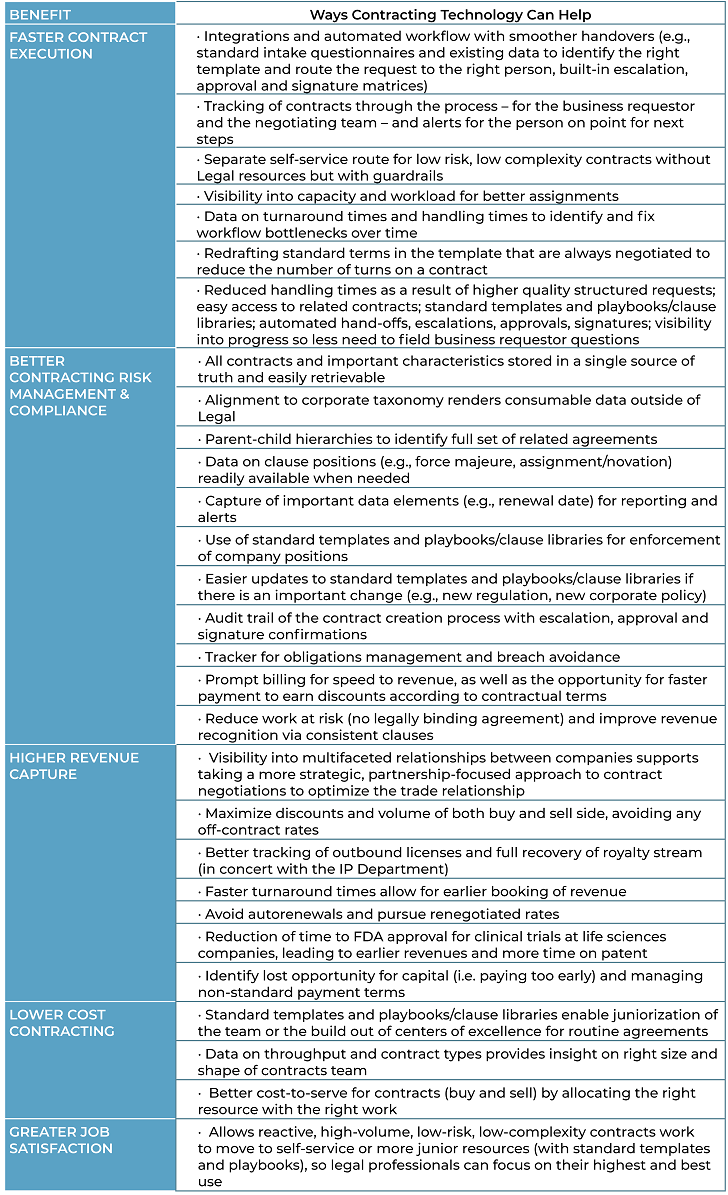 A well-designed enterprise contracting capability knits together multiple departments (and their supporting technology systems) so that contracting is conducted with full knowledge of the extent of the corporation’s relationships with suppliers, customers and partners (including those with multiple roles) across the enterprise. In this scenario, the company acts upon obligations proactively, executes quickly, and manages risk efficiently and effectively. With digitized the contracting process, contracts become sources of structured data, which can be harvested and analyzed. Systems integrations are critical for the transfer of data, not only to move things along, but to provide insights to support decisions and prompt timely action over the course of a business relationship. In particular, contracting technologies offer data to Legal leadership that has been unobtainable historically. With contracting technology in place, GCs can contribute data and insight to corporate strategy, rather than being confined to the siloed perspective of risk mitigator (aka “barrier”) and cost center.
A well-designed enterprise contracting capability knits together multiple departments (and their supporting technology systems) so that contracting is conducted with full knowledge of the extent of the corporation’s relationships with suppliers, customers and partners (including those with multiple roles) across the enterprise. In this scenario, the company acts upon obligations proactively, executes quickly, and manages risk efficiently and effectively. With digitized the contracting process, contracts become sources of structured data, which can be harvested and analyzed. Systems integrations are critical for the transfer of data, not only to move things along, but to provide insights to support decisions and prompt timely action over the course of a business relationship. In particular, contracting technologies offer data to Legal leadership that has been unobtainable historically. With contracting technology in place, GCs can contribute data and insight to corporate strategy, rather than being confined to the siloed perspective of risk mitigator (aka “barrier”) and cost center.
That said, we can’t ignore cost when assessing contracting technology options. Critical to obtaining support and budget for investments in contracting solutions is developing a business case that features reasonable and tangible benefits, justifying the return on investment. Though many vendors offer “ROI calculators” or indicate benefits exceeding millions of dollars due to “potential” risk avoidance, strong business cases contain actionable “hard” benefits that are likely and verifiable. To make the case for the technology, you will need to verify the baseline for critical metrics and put a value to future improvements. Once the solution is deployed, you will need to capture actual data for the critical metrics to prove the business case.
We have identified 5 benefit categories below, some of which are easier to measure/estimate than others:

Lindsey Pitt, Vice President of Legal Business Advisory, brings more than 25 years of experience to Epiq. Over the past decade, she has been responsible for consulting on, designing, and launching some of the legal industry’s most innovative tech-enabled contract management and legal operations solutions. Lindsey is a graduate of Cambridge University and has an MBA from Harvard Business School.




